Source: People’s War, People’s Army (1962), pp. 4-5
Context: In August 1945, the capitulation of the Japanese forces before the and the Allied forces, put an end to the world war. The defeat of the German and Nippon fascists was the beginning of a great weakening of the capitalist system. After the great victory of the Soviet Union, many people's democracies saw the light of day. The socialist system was no longer confined within the frontiers of a single country. A new historic era was beginning in the world. In view of these changes, in Viet Nam, the Indo-chinese Communist Party and the Viet Minh called the whole Vietnamese nation to general insurrection. Everywhere, the people rose in a body. Demonstrations and displays of force followed each other uninterruptedly. In August, the Revolution broke out, neutralising the bewildered Nippon troops, overthrowing the pro-Japanese feudal authorities, and installing people's power in Hanoi and throughout the country, in the towns as well as in the countryside, in Bac Bo as well as in Nam Bo. In Hanoi, the capital, in September 2nd, the provisional gouvernment was formed around President Ho Chi Minh; it presented itself to the nation, proclaimed the independence of Viet Nam, and called on the nation to unite, to hold itself in readiness to defend the country and to oppose all attempts at imperialist aggression. The Democratic Republic of Viet Nam was born, the first people's democracy in South-east Asia. But the imperialists intended to nip the republican regime in the bud and once again transform Viet Nam into a colony. Three weeks had hardly gone by when, on September 23rd, 1945, the French Expeditionary Corps opened fire in Saigon. The whole was to be carried on for nine years at the cost of unprecedented heroism and amidst unimaginable difficulties, to end by the shining victory of our people and the crushing defeat of the aggressive imperialists at Dien Bien Phu.... Never before had there been so many foreign troops on the soil of Viet Nam. But never before either, had the Vietnamese people been so determined to rise up in combat to defend their country.
Võ Nguyên Giáp Quotes
Võ Nguyên Giáp was a general in the Vietnam People's Army and a politician. Võ Nguyên Giáp is considered one of the greatest military strategists of the 20th century. He first grew to prominence during World War II, where he served as the military leader of the Viet Minh resistance against the Japanese occupation of Vietnam. Giáp was a crucial military commander in two wars: the First Indochina War of 1946–1954, and the Vietnam War of 1955–1975, participating in several historically significant battles: Lạng Sơn in 1950, Hòa Bình in 1951–1952, Điện Biên Phủ in 1954, the Tết Offensive in 1968, the Easter Offensive in 1972, and the final Ho Chi Minh Campaign of 1975.
Giáp had no direct military training and was a history teacher at a French-speaking academy, influenced by historical military leaders and personally citing T. E. Lawrence and Napoleon as his two greatest influences.
He would later earn the moniker "Red Napoleon" by some Western sources.Giáp was also a journalist, an interior minister in President Hồ Chí Minh's Việt Minh government, the military commander of the Viet Minh, the commander of the People's Army of Vietnam , and a defense minister. He also served as a member of the Politburo of the Vietnam Workers' Party, which in 1976 became the Communist Party of Vietnam.
Giáp was a mastermind military builder; during the First Indochina War, he had transformed a rag-tag band of rebels to a 'fine light-infantry army' fielding cryptography, artillery and advanced logistics and capable of challenging a larger, modernised French Far East Expeditionary Corps and the Vietnamese National Army. He was also a very effective logistician, laying the foundation of the Ho Chi Minh trail, recognised as one of the great feats of military engineering of the 20th century.Võ Nguyên Giáp served as Military Minister and Chief of Staff, and is often credited with North Vietnam's military victory over South Vietnam and the US during the Vietnam War. Recent scholarship indicates other leaders had played more prominent roles, with former subordinates and now rivals Văn Tiến Dũng and Hoàng Văn Thái assuming a more direct military responsibility than Giáp. Nevertheless, he played a pivotal role in the second transformation of the PAVN into "one of the largest, most formidable" mechanised and combined-arms fighting force capable of delivering a knockout blow to an increasingly more powerful rival Army of the Republic of Vietnam in conventional warfare.
Wikipedia
